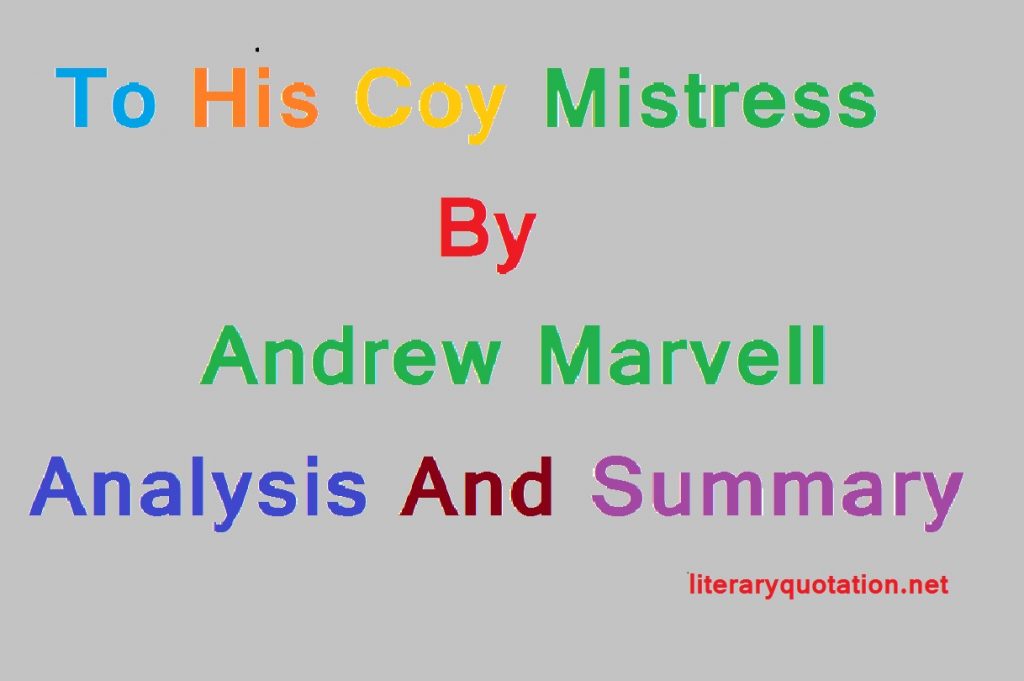A lot of students have asked me to discuss about “to his coy mistress analysis”. “To His Coy Mistress” is undoubtedly the best know love poem written by Andrew Marvell who is known as the metaphysical poet of the seventeenth century. It deals with “Carpe Diem” theme. “Carpe Diem” which is a latin phrase, means to seize opportunity. The full implication of the phrase is enjoy the present moments without caring for the future”.
It is a common theme on which many poets of different age wrote their poems. Robert Herrickm John manseield etc wrote the poem in “Carpe Diem” The poem is full of conceits. ‘Time’ is very valuable in his poem. Time plays a destructive role. In Shakespeare’s sonnet ‘Time” is very destructive. Time kills the beauty.
Table of Contents
Andrew Marvell To His Coy Mistress Analysis
The opening lines of this poem prove that time is very valuable to the poet. He says in the following ways:
“Had we but world enough time
This coyness, lady, were no crime
We would sit down and think which way
To talk and pass our long love’s day”
In this poem, the poet advises his mistress to enjoy life. Time is very limited. Death will come soon. So life should be enjoyed as early as possible. The poet is anxious thinking that after death of the mistress, when she will lie in marble tomb, all the beauty of her fade away.

Her body will decompose and become the food of the worms. She can no more here the sweet love song of the poet. So the poet urges the mistress to think of all this and enjoy when their ages are young and their passions are serious. He motivates his mistress in the following way.
“Thy beauty shall no more be found
Nor, in thy marble vault, shall sound
My echoing song: then worms shall try
That long preserved virginity”
In this poem, we see that a lover address his beloved who refuses to grant him sexual favors on account of her modest and her sense of honor. The lover says that her coyness would have been justified if they had enough time and space at their disposal.
The poet emphasizes their immediate fulfillment of love, instead of waiting for thousands year. The fear of death makes the poet eager to enjoy love and life while are strong and young. Time is passing . None can escape death. The poet expresses his passionate love for his coy mistress who is slow and unwilling to respond to his love. He expresses the idea by two conceits drawn from the Bible.
“I would love ten years before the flood
And you should if you please refuse
Till the conversion of the Jews”
To his coy mistress as a metaphysical poem or metaphysical conceit in coy mistress
As a metaphysical poem, “To His Coy Mistress” is full of hyperbole and conceits. The poet highly praises his beloved. He admires his mistress physical organ. The poet says that he can spend hundred years for praising the eyes and two hundred years for admiring the Brest of his mistress. He can devote thirty thousands years for praising the rest.
“An hundred years should go to praise
Thine eyes and on thy Forehead Gaze
Two hundred to adore each breast but thirty thousand to the rest”
To his coy mistress as a love poem
“To His Coy Mistress” is actually love poem where the poet might grow slowly as like as vegetable. Vegetable love s a blod conceit in this poem. He says:
“My vegetable love should grow
Vaster than empires and more slow”
By reading this poem we can realize the poet’s sense of sadness and sense of humor. There seems to be genuine anguish in the middle section of “To His Coy Mistress”. The last section of this poem there is violence and a touch of desperation which is correctly shown by the poet in the following lines:
“Let us roll our strength and all
Our sweetness up into one ball”
As a love poem “To His Coy Mistress” is unique and pure. The poet is very enthusiastic about his mistress. The slow nature of his mistress make pain in the poet. The poet would like to see his mistress very fast and active to enjoying their love. The poet tries to convince his mistress that it is their high time to make love and fulfill their carnal desire.
Read More Literary Writings:
Tennyson as a representative poet of his age or Victorian Period
Treatment of Nature in the poem of Tennyson
Michael by William Wordsworth as a tragedy of human life
Somebody Once Told Me The World Was Macaroni Lyrics
The Love Song of J. Alfred Prufrock represents conflict of modern man
Robert Browning as a writer of dramatic monologue


